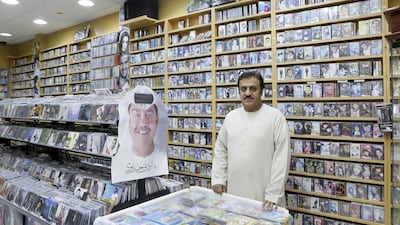In a quiet part of the Madinat Zayed shopping centre sits one of the few remaining cassette shops in Abu Dhabi. Hundreds of tapes line its shelves, Arab singers stare down from posters on the walls and behind the counter sits shop owner Abdul Hamid.
Al Balad Audio Cassettes has been serving discerning customers for more than 30 years, despite the format being overtaken by CDs, then MP3s and now online streaming services such as Spotify. Here, classic tapes from icons of Arab music such as Egyptian singer Umm Kulthum and Lebanon’s Fairuz sit beside newer artists such as Emirati Hussain Al Jassmi.
Hamid, who is from the UAE, opened the store in 1986 in Abu Dhabi’s labyrinthine old souq. Built in the 1970s between Hamdan and Khalifa streets, most of the souq was gutted by a fire in 2003 and shut down. Hamid then moved to the Madinat Zayed centre and tells me that about 80 per cent of the traders did the same.
Today’s shopping centre has the atmosphere of a covered market and, along with the gold centre, its small shops offer an eclectic mix of jewellery, tailoring, abayas, kanduras, electronics, watches, mobile phones and perfumes.
As we discuss the move, he points out the other traders who moved with him. “This one, that one – all these shops came from the souq. Here, business is better,” he says, pointing to his neighbours.
Every cassette in Al Balad is a time capsule: faces of Arab artists long-forgotten gaze from the covers and the artwork signifies a time and place that no longer exists. Many were produced years ago by labels such as Saudi Arabia’s Rotana and Kuwait’s Romco.
Hamid points out some of the top-sellers as he walks around the shop – Emirati artists Mehad Hamad; Ahlam; and Fayez Al Saeed, while Saudi Arabian musician Rashed Al Majed also sells well. There are also racks of CDs, some vinyl and a handful of English tapes by the likes of Texas, boyband Five and rapper Ja Rule.
Hamid charges just Dh10 for a cassette; CDs go for about Dh30. And while he shifts more CDs than tapes these days, he still manages to sell up to 100 cassettes a week. Business has fallen over the past two years, Hamid tells me, but about 40 to 50 people visit his shop every day.
For me, there’s a certain nostalgia when browsing the shelves of this store; some of the first albums I bought in the early 1990s were on cassette, and somewhere in cold storage in my parents’ house is an old Sony Walkman.
Older analogue formats such as vinyl and to a lesser extent, cassettes, have made a return over the past few years. Now there’s even an International Cassette Store Day. And while the memories of getting tape mangled in cassette decks and using a pencil to wind the reel are enough to put most of us off ever using the format again, some like buying the physical product; prefer the cassette sound; their collectability; and links to underground music scenes.
While there used to be dozens of cassette shops across Abu Dhabi, today there are only a few left: besides Al Balad, Shan Radio Centre, another former old souq trader, operates from a small kiosk on Hamdan Street, and Andalib Recording sells cassettes from its shop off Muroor and Dihan Street.
A lot of Hamid’s customers, who come from across the Middle East and even include some Europeans, still have tape decks in their cars. Some from Al Gharbia, Abu Dhabi’s Western Region, go far out of their way to come to the shop.
“Many come from towns such as Ghayathi and Liwa. In these towns they use either cassettes or USB connections as CDs skip too much when you are driving across the desert.
“Many Omanis come through via Al Ain and they also like cassettes. I have customers from many Gulf countries who only own decks. Some buy them for decor – to remember the old days. Others because CDs will scratch and cassettes can have a long life.”
Sadly Al Balad won’t be selling tapes for ever. Hamid explains that his prized cassettes come from older stock that he purchased back in 2011 and there is no new supply. “I’ve only about 7,000 or 8,000 left. When these are finished, I’ll keep selling CDs.” Fans of bygone days and sounds should get down there quick.
John Dennehy is deputy editor of The Review.


